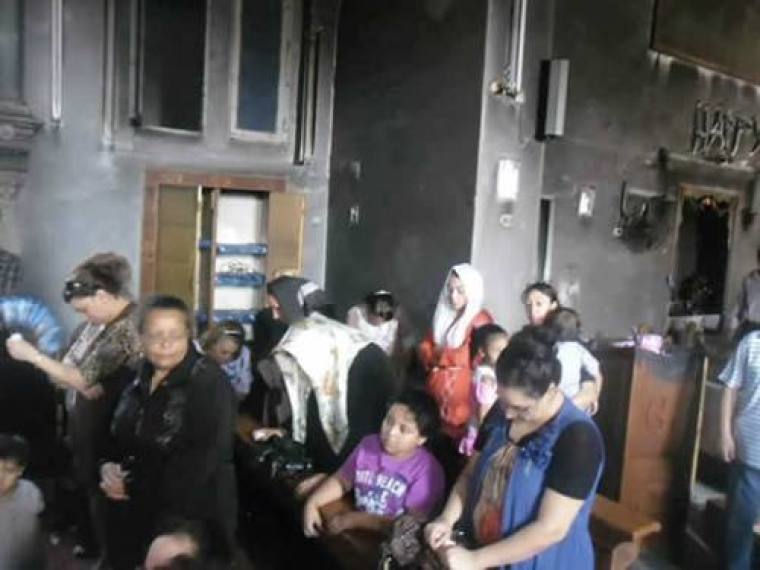
The jizya is, on the face of it, a protection racket; it is a humiliating tax or tribute historically imposed by Muslims on Christians and Jews in "conquered" territory to safeguard their existence.
But its significance runs deeper than that of a mafia-style extortion scheme. The Quran commands that non-Muslims pay the jizya "with willing submission and while feeling themselves subdued" (9:29).
It is part of a collection of rules and regulations imposed on those granted dhimmi status that are intended to mark them out as inferior to Muslims. So while paying the jizya does guarantee a level of protection for Christians and Jews, it comes at the high price of them accepting a sub-class status in which they are not recognised as citizens and their rights are restricted.
The only way for conquered subjects to exempt themselves is to convert to Islam or to leave. Those who refuse to pay are liable to be killed as they are considered to have broken a pact with the Muslims.
This archaic tax is being enforced today in parts of Minya and Assuit, where Islamists remain strong. These provinces both have a large Christian population, Minya, the largest in Egypt, providing ruthless Muslims with ample targets.
Egyptian Christians are particularly loathe to pay the jizya – and the acceptance of inferiority that comes with it – as they are descended from the pharaonic Egyptian people who long pre-date the Arab Muslim settlers' arrival in the country. They understandably resent being made non-citizens by those who came after them.
Minya and Assuit were among the areas worst affected by the anti-Christian violence unleashed by the Muslim Brotherhood in the wake of Morsi's removal from power; scores of churches were torched, countless Christian homes and businesses destroyed and a number of Christians killed.
With such a trail of devastation in their wake, the Islamists' demand that Christians pay the jizya – or else – has been no idle threat.
Christians murdered
On 12 September, two Christians were shot dead in Assuit Province for refusing to pay up. Emad Damian (50) and his cousin Medhat Damian (37) from the village of Sahel Selim were contacted two days before their murder by the leader of a Muslim gang, who demanded 10,000 Egyptian pounds (US$1,400).
Emad's brother, Dr Samy Damian, said, "My brother said that he had no problems with anyone, does not require services from anyone, and does not have the money."
The two threatened cousins reported the matter to the police and asked for protection but received no support.
The jizya has also been imposed on Christians in the village of Dalga, Minya, which Morsi's supporters captured following his ouster.
Church leader Yunis Shawqi said that it was applied to all the Christians "without exception", although the "value of the tribute and method of payment differ from one place to another in the village, so that, some are being expected to pay 200 Egyptian pounds (US$30) per day, others 500 Egyptian pounds (US$70) per day".
In some cases, those who have not been able to pay have been attacked and their wives and children beaten and/or kidnapped. At least two people have been killed in Dalga since Morsi's ouster.
Christians abandoned
The Christians of Dalga have felt abandoned by the Egyptian authorities. On Monday (16 September), the latter finally recaptured the village after two earlier failed attempts and arrested at least 45 people suspected of carrying out attacks on Christians, including murder.
But the intervention has come too late for hundreds of Christians who had already fled the village.
Antwan Adel, spokesperson for the Christian rights group Maspero Youth Union, said: "Christians in Dalga were living like prisoners in their homes thanks to a campaign of intimidation by Islamists and Muslim Brotherhood sympathisers. They went to Christian houses to demand money and threatened to burn them down or abduct family members if they didn't pay."
The Egyptian military was swift to remove Morsi from power in response to major public protests, but it has been slow to restrain Islamist influence in some parts of the country – and it has been the vulnerable Christian minority that has paid the price.
The authorities are currently fighting militants in the Sinai Peninsula and say they are planning assaults on up to ten towns in Minya where Islamists have also weakened state control since July.
They must get to grips with the militants or else could find themselves facing an insurgency in central and southern Egypt. The security of the region's Christians depends on it.